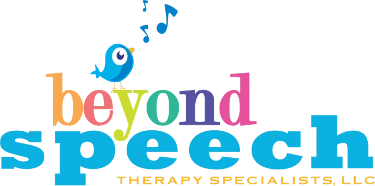It can feel like parenting comes with an almost endless list of questions and concerns, especially when it comes to your child’s development. In terms of speech development, if you’ve found yourself wondering, “My why 1-year-old is not talking yet, what should I do?”, you’re not alone!
Understanding speech milestones, and knowing when to seek guidance, can really help to alleviate some worries and also make sure that your child receives the support they need.
At Beyond Speech Therapy Specialists, we are able to provide insights into speech development at any age but today let’s focus on age 1; the typical milestones, signs of potential delay and steps you can take for proactive intervention.

Speech Development & Milestones for 1-Year-Olds
At 12 months, children typically will reach several speech and language milestones.
While every child develops at their own pace, here are some general expectations for speech development:
- Babbling: By 12 months, most babies can babble with a variety of sounds, such as “ba-ba,” “da-da,” and “ma-ma.”
- First Words: Some children may say their first recognizable word around their first birthday, such as “mama,” “dada,” or simple words like “ball” or “dog.”
- Imitating Sounds: Babies at this age often imitate sounds and gestures they hear from caregivers and siblings.
- Understanding Simple Commands: They can typically follow simple commands, such as “wave bye-bye” or “give me the toy.”
- Start To Be Understood: Be approximately 12-50% intelligible (understandable) to strangers
Signs of A Possible Delay
It’s important to remember that every child develops at their own pace; however, it’s good to be aware of signs that your 1-year-old may be experiencing a delay in their speech development.
- Limited Babbling: If your child isn’t babbling or making consonant-vowel combinations (e.g., “ba-ba,” “da-da”) by 12 months.
- Lack of Gestures: Not waving bye-bye, pointing or using other gestures to communicate non-verbally.
- Limited Imitation: Difficulty imitating sounds, gestures or facial expressions.
- Lack of Words: Not saying any single words by 15 months or using fewer than five words by 18 months.
- Difficulty Following Simple Directions: Trouble understanding or responding to simple commands or questions.
What to Do If You Suspect a Speech Delay
If you suspect that your 1-year-old may have a language delay, taking proactive steps can make a significant difference in their development.
If you are concerned, start here:
- Consult with a Pediatrician: Schedule a visit with your child’s pediatrician to discuss your concerns. They can assess your child’s overall development and refer you to a pediatric speech-language pathologist (SLP) for further evaluation if necessary.
- Schedule a Speech-Language Evaluation: A pediatric Speech Language Pathologist (SLP) can conduct an evaluation to assess your child’s speech and language skills. They will observe your child’s communication abilities, assess their understanding of language, and provide personalized recommendations for interventions, if necessary.
- Always Promote Speech Development at Home: During the day at home, engage in activities that promote language development. Things like reading books together, singing songs and talking to your child throughout the day are simple ways to promote speech.
- Consider Early Intervention Services: If a delay is identified, early intervention services can be very helpful. These services can include speech therapy sessions designed to address your child’s specific needs and help them develop communication skills.
All development, language included, occurs on a spectrum and kids can fall anywhere along that spectrum.
If you have concerns about your 1-year-old’s speech development, don’t hesitate to seek out information, guidance and support from professionals. With early intervention and support, you can help your child thrive and reach their full potential in communication and beyond!
At Beyond Speech Therapy Specialists, we’re here to support you every step of the way on your parenting journey! Reach out today and let us know how we can help you.

